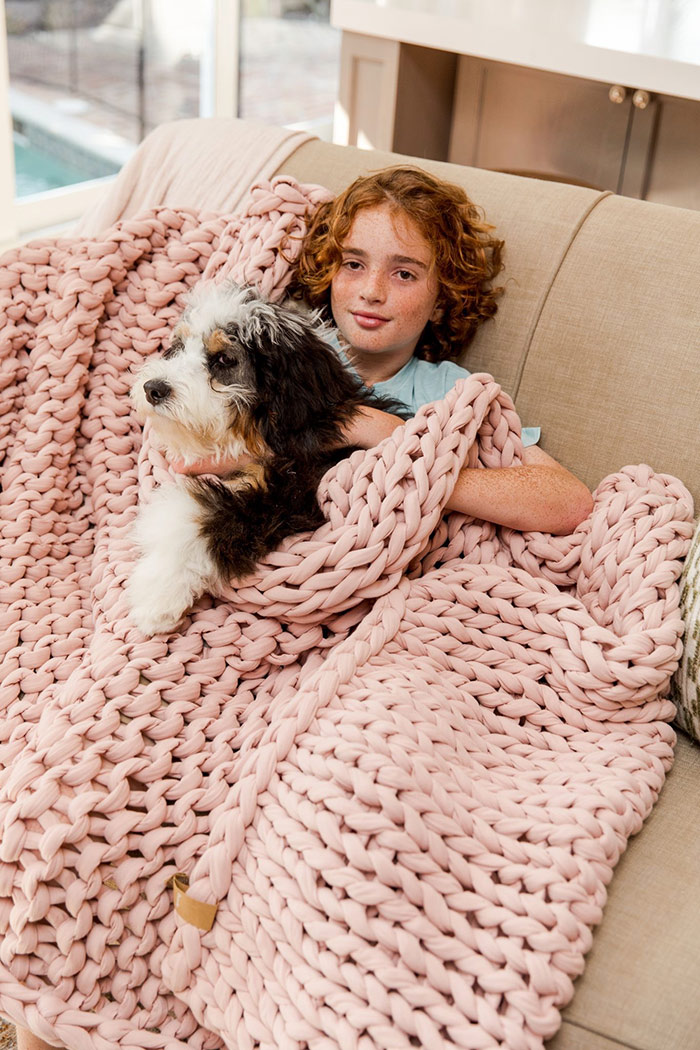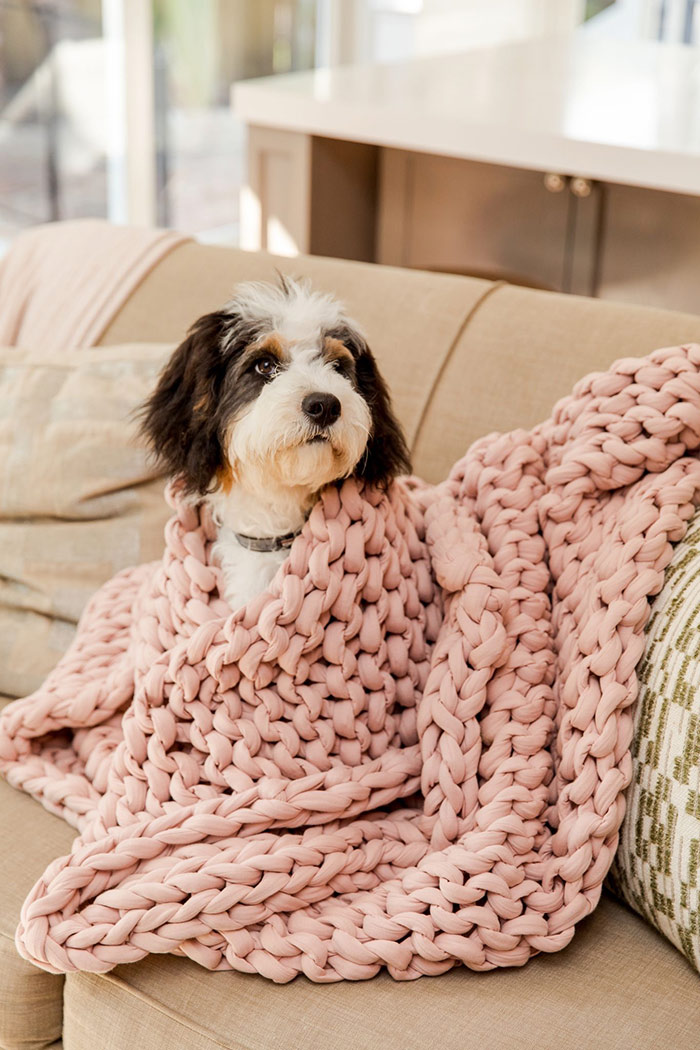
The Benefits of Weighted Blankets for Dogs Suffering with Anxiety
Does your anxious pup need a weighted blanket for dogs?
We all know the uncomfortable and sometimes TERRIFYING feeling of anxiety. Especially following this past pandemic year, stress and anxiety are at an all-time high. While it’s easy to understand and relate to another person’s anxiety and stress, we may not realize that our pets often suffer from the very same feelings.
Having owned a small animal hospital for more than a decade, I am all too familiar with the effects and impacts stress and anxiety have on pets. Just like us, pets experience clinical signs, illnesses, and often debilitating impacts of anxiety.
So today, I want to point out the common signs that your pet may be suffering with anxiety. I’ll also share ways to help relieve that stress, including a special calming treat for dogs.
What is Anxiety in Pets?
Anxiety in pets presents as involuntary, full-blown panic attacks, which pets may experience during real or perceived events.
The most common stressor for pets is separation anxiety, which occurs in 20% of dogs. With separation anxiety, pets do not feel safe when separation from their guardians or people they’re attached to occurs.
Another form of anxiety in pets is often called “thunderstorm anxiety.” With this type of anxiety, thunder or other loud noises, like fireworks, trigger a panic attack.
Pets that have been exposed to cruelty, abuse, or neglect, may be prone to anxiety; however, any animal with any background can experience anxiety.
Recognizing the Signs of Anxiety in Pets
The most common clinical signs of pet anxiety are disruptive or destructive behaviors. These troubling behaviors often indicate distress:
- Urinating or defecating in inappropriate places
- Hypersalivation
- Barking or howling
- Chewing or destroying items
- Digging
- Trying to escape
- Pacing
- Attempting to prevent you from leaving
How to Help Pets Suffering with Anxiety
First of all, always schedule an appointment with your veterinarian if you believe your pet is suffering with anxiety. Your veterinarian will perform a thorough examination and recommend bloodwork (CBC and chemistry panel) to rule out medical conditions that may cause stress and anxiety.
Once your veterinarian officially diagnoses your pet with anxiety, there are several things you can do to help relieve stress and discomfort.
1. Behavior Modification
When dealing with anxiety, the behavior modification methods most Certified Applied Animal Behaviorists (CAAB or ACAAB) or board-certified veterinary behaviorists (Dip ACVB) use are desensitization and counter-conditioning.
Desensitization involves exposing the pet to a stimulus that creates anxiety at a level at or below which fear is likely to be exhibited.
Counter-conditioning actually changes the pet’s attitude or emotional response to a stimulus. It is generally involves a complex training schedule at home, one created by a professional in the field.
Speak with your veterinarian regarding a proper behavior modification regimen for your pet.
NOTE: You should NEVER punish or scold your pet for the behavior they exhibit in response to anxiety. Anxious behavior is NOT disobedience. It is a distress response. So creating a negative reaction to that response will only exacerbate the problem.
2. Weighted Blankets and Compression
Compression and weighted blankets can be integral tools for creating a calming effect for people. And the trick works for our pets, too!
I regularly hear from my pet parents that using a weighted blanket for dogs during times of anxiety (thunderstorms, separation, car rides, etc.) makes their pets become less restless and more calm.
Weighted blankets can be a special calming treat for dogs!
Personally, I recommend and use Bearaby blankets. I have these blankets for myself, my kids, and my new pup, Hank. The blanket has an open-loop knitted design, which allows for breathability. If a small pet does accidentally get trapped under the blanket, there is no risk of suffocation as the design does not trap heat or block airflow.
Bearaby blankets are also free of artificial filler beads or pellets. If the blanket is damaged (say your pet decides it’s their new chew toy!), there aren’t any beads or pellets to spill out and pose a choking hazard.
I love creating safe and positive environments for pets to ease anxiety and stress. Bearaby blankets create that calming, happy, soothing environment for you and your pet.
3. Medications and Supplements
Sometimes we do prescribe anti-anxiety medications to ease stress in pets, especially for those animals suffering with severe anxiety disorders.
Natural supplements, like pheromones and melatonin, may also help alleviate some stresses. Always consult your veterinarian or veterinary behaviorist before giving any medications.
Final Thoughts on Treating Anxiety with a Weighted Blanket for Dogs
Anxiety is a very real and serious condition in pets and something I regularly see and treat at my animal hospital. It is so important to understand that anxiety in dogs and cats, just like in humans, is a state of distress and an overwhelming feeling of being unsafe.
So never treat anxiety in pets as an act of disobedience.
Anxiety is truly a medical condition to address in a positive and safe environment. Always consult your veterinarian with any concerns or questions regarding your pet’s behavior.




